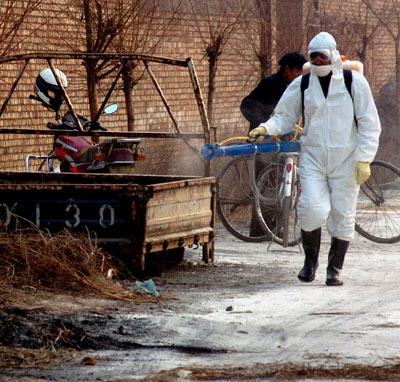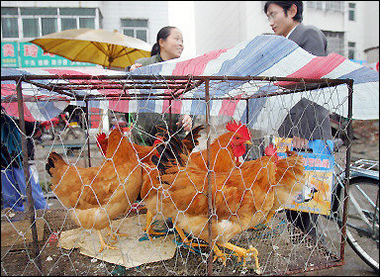
The next pandemic?
CBC News Online Updated Nov. 24, 2005
H5N1. A string of numbers and letters that has the World Health Organization deeply concerned.
PREVENTING THE FLU: WHAT YOU CAN DO
Get a flu shot. There is no vaccine for avian flu but it may boost your overall immunity, health officials say.
Wash your hands to wash away the flu virus
Cover your mouth when you sneeze or cough
Stay home if you are sick.
More on what you can do here It's one of 16 varieties of avian influenza - bird flu. So far, it's the only one that's shown any ability to directly pass from one human to another. It has spread from Southeast Asia to China, Russia and now Europe.
Hong Kong, 1997. Eighteen people are stricken with severe respiratory disease. Six of them die. The cause ? the H5N1 strain of avian influenza. The infection of humans coincides with an epidemic of a particularly nasty bout of avian influenza in Hong Kong's poultry population, caused by the same strain.
Health officials determine that close contact with live infected poultry was the source of human infection. It's the first time that evidence can be found that the virus had jumped directly from birds to humans.
Health officials order the destruction of Hong Kong's poultry population. More than 1.5 million birds are killed in three days. There are no more cases of direct transmission of the disease from birds to humans. Some health experts say the action may have averted a pandemic.
ANTIVIRAL DRUGS
Antiviral drugs like Tamiflu and Relenza block the flu virus from escaping an infected cell and spreading further. But the drugs have to be taken within 48 hours of getting the flu. Canada has purchased 23 million doses of Tamiflu.
More Vietnam, 2004. Eight new cases of avian influenza in people. Six people die. Health officials order the culling of millions of birds to try to minimize the threat to people.
But killing millions of birds has not eliminated the threat to people from avian flu. By Feb. 2, 2005, 55 people in Vietnam, Cambodia and Thailand had come down with the disease ? 42 died.
Indonesia, 2005. A man and his two daughters die of H5N1, although none of them worked around poultry. The WHO says it cannot rule out the possibility of human-to-human transmission of avian flu in these cases.
And in October 2005, H5N1 was confirmed to have spread to fowl in Romania and Turkey. Days later, a bird on the Greek island Oinousses was found to have avian flu, although officials hadn't immediately identified the strain.
In November 2005, the H5 strain hit Canada. Two wild ducks tested positive for H5N1 virus, but not the dangerous strain of the flu hitting Southeast Asia. The virus was also found in a commercial duck on a farm in Chilliwack, B.C. The food inspection agency maintained the virus does not pose a risk to humans, but ordered the slaughter of all birds on the farm as a caution. Every farm in a five-km radius was placed under quarantine. Agency officials said they've also isolated an H5N3 subtype in two birds from Quebec.
AVIAN FLU VACCINE
Flu viruses mutate often ? their characteristics change rapidly and permanently. It takes at least four months to develop new vaccines to combat strains of the flu that emerge. Although a vaccine against the H5N1 virus is under development in several countries, no vaccine is ready for commercial production and no vaccines are expected to be widely available until several months after the start of a pandemic.
The WHO says influenza pandemics can be expected to occur three or four times each century, when new virus subtypes emerge and are readily transmitted from person to person. The last great pandemic occurred in 1918-19, when Spanish flu swept the world, killing 40-50 million people, including more than 50,000 in Canada.
Experts agree that another pandemic is inevitable and possibly imminent.
The WHO is paying particular attention to H5N1 for several reasons:
It mutates rapidly and now has a history of being able to acquire genes from viruses infecting other animal species.
It has caused severe disease in humans.
Laboratory studies have demonstrated that isolates from this virus have a high pathogenicity and can cause severe disease in humans.
Birds that survive infection excrete virus for at least 10 days making it easier to spread the virus at live poultry markets and by migratory birds.
SYMPTOMS OF AVIAN FLU
The symptoms of avian flu in humans are similar to other strains of the flu and include:
Fever
Fatigue
Cough
Sore throat
Eye infections
Muscle aches.
The WHO also says the epidemic in birds caused by H5N1, which started in December 2003 in Korea, has spread to other countries. More infected birds increases the opportunities for direct infection of humans. If more humans become infected, the WHO says the odds also increase that humans ? if they're infected with human and avian influenza strains at the same time ? could serve as a "mixing vessel" for a mutated virus that spreads easily from person to person. That would mark the start of a flu pandemic.
Alberta's health minister ? Iris Evans ? says most people don't understand how overwhelmed the health-care system would become if there were a flu pandemic.
"What worries me most is the ignorance of people in the public who assume that if they get sick there'll be something there for them, and they don't realize the devastation this could be."
Flu would hit health-care workers as well. As many as a third of Canadians could fall ill at the same time.
Virologist Dr. Todd Hatchette is concerned about H5N1. "The virus has gained the ability to infect a large number of hosts ? not only the chickens that it normally infects but tigers, cats and transmitted to humans, and there's some evidence that it's refining its genes, if you will. I'll suggest that it's pretty good evidence that this will probably be the next one."
ADVICE FOR TRAVELERS:
If you are traveling to a country infected with bird flu, avoid unneccesary contact with domestic poultry and wild birds. Evidence suggests that the risk of infection is greatest in persons having direct contact with live and/or dead poultry including surfaces contaminated with their feces or secretions.
More advice for travellers In February 2004, another strain of avian influenza ? H7N3 ? swept through B.C.'s poultry industry. The province ordered more than 17 million birds killed. It took about six months for the province to be declared free of avian flu. The outbreak was devastating to the poultry industry. There were also two documented cases in people, who showed mild influenza illness and eye infections.
The former medical officer of health for Ontario ? Dr. Richard Schabas ? is not convinced that H5N1 is a pandemic-in-waiting. "Our science just isn't strong enough for us to know that and it's not strong enough for us to be making these kinds of alarmist predictions that we're hearing from the WHO and others," Schabas told CBC News. "This is the third time the WHO has told us were on the brink of an avian influenza pandemic. They said it in 1997 and they were wrong. They said it a year ago and they were wrong."
There are few warning signs before a pandemic strikes ? except a large and rapidly growing number of new and unrelated cases every day. The WHO says in the best-case scenario, two to seven million people will die in the next pandemic and tens of millions will need medical attention. But if the virus is particularly virulent, the number of deaths could be dramatically higher.
The organization warns that the global spread of a pandemic can't be stopped ? but preparing properly will reduce its impact.
The WHO says Canada's preparations appear to be on the right track.
CBC News Indepth: Avian Flu




















